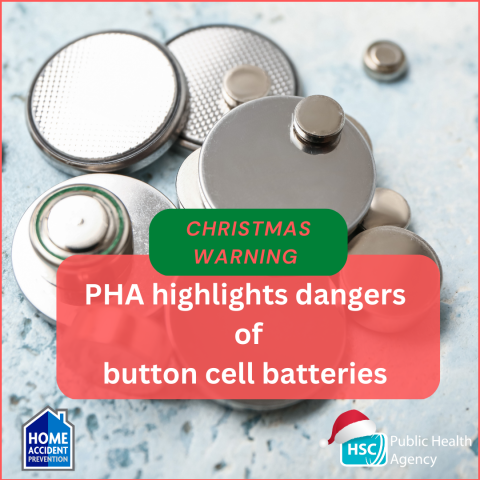PHA highlights dangers of button cell batteries ahead of Christmas

Christmas is nearly upon us and with many toys coming into homes in the next few weeks, the Public Health Agency (PHA) is warning parents and caregivers about the dangers of children swallowing lithium button cell batteries.
Button cell batteries are used in many toys and swallowing can cause choking, burning or poisoning and can lead to life-changing injuries or potentially death.
“The festive season usually means that there will be new and pre-loved toys coming into the home and therefore a rise in the number of the small batteries which are inside many toys, musical Christmas cards, remote controls and lots of electronics,” Janine Gaston, the PHA’s Lead on Home Accident Prevention, said.
“Young children are naturally curious and sometimes explore the world by putting things in their mouths. If undetected, button cell batteries can do serious damage to the gastrointestinal system. Lithium batteries react with saliva, creating an electrical current which results in a build-up of caustic soda, which will burn through the oesophagus and major blood vessels.
“This can cause serious, life-changing injury, and if not caught in time, can be fatal.”
Top tips to help protect young children from the dangers of button cell batteries:
- battery compartments should be checked to make sure they can’t be opened or broken easily;
- the Toy Safety Regulations require toys that use button batteries to have lockable battery compartments. Check that these are secure and undamaged and do not use toys that don’t have lockable compartments. Take care when changing batteries to make sure the compartment is secured afterwards and the old battery is disposed of safely.
- keep spare batteries in a safe place out of reach of children;
- if you suspect your child has swallowed a button battery, seek medical help immediately.
“We are keen to raise awareness of the danger of these batteries with parents, grandparents, childminders and carers.,” Janine said.
“Treat the batteries the same way you would any poisonous substance – keep out of reach and out of sight. It’s also really important to follow the manufacturers’ guidelines and using your own judgement to select toys that are appropriate for the age and ability of the intended recipient.
“Some children, particularly those under three, are more vulnerable to choking, therefore it is important to buy age-appropriate toys. We should also think about the ability and needs of the child – there can be significant differences in the abilities of children within the same age group, as children develop as different paces – if you think there are risks associated with the toy, then it is best to avoid buying it.”
To find out more about toy safety visit www.rospa.com/home-safety/advice/product/toy-safety https://capt.org.uk/button-battery-safety/ https://capt.org.uk/buy-safe-toys/
See the damage a button cell battery can do by watching this video www.pha.site/buttonbattery
A ‘Home Accident Prevention’ campaign is running in local community pharmacies as part of the Living Well service. It aims to reduce the number of accidents in the home by raising community awareness of hazards and increasing knowledge on how to eliminate risks. The campaign will run throughout December and January.
Community pharmacies across Northern Ireland are providing free information booklets to members of the public. The ‘Home safety – How to spot hazards’ leaflet can be found at www.pha.site/Living-Well
